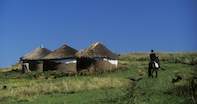During the last decades of the Dutch regime and the first decades of British rule, the eastern frontier of the Cape had become troublesome and turbulent. The problem, as always, was land.

Livestock Need Land
As European farmers migrated further along the coast, they needed more and more land on which their livestock could graze. At first, the trekboers (travelling farmers) found the land sparsely populated and the scattered locals easy to overcome.
This was partly the result of a series of devastating smallpox epidemics which swept the entire region from 1717 onwards, killing many Khoikhoi and shattering their clans and tribal groups.
By the 1780’s, however, the trekboers had reached the vicinity of the Great Fish River, near modern-day East London, and there they met the Xhosa.
The Xhosa and Europeans Meet
The Xhosa were quite distinct from the Khoikhoi and Bushmen (San), who had hitherto been the only indigenes to interact with the Europeans. Instead, this powerful nation was of Bantu lineage, and had originated in West Africa before trekking down the African continent from about 4000 years ago.
By 1000AD, Bantu migrants had settled along South Africa’s eastern coast, eventually evolving into the Zulu and Xhosa cultural groups of today. The Sotho, also of Bantu ancestry, arrived a couple of hundred years later and chose to settle on the high plateau of the interior.
The Europeans were thus unprepared to come face to face with a populous, powerful nation of tall, well-built warriors who were prepared to fight for their fertile homeland.
Similarly, the Xhosa were unprepared to deal with the tenacious long-hairs who wore strange clothes and carried fire-sticks. Tensions arose immediately.
A Wild and Lawless Bunch
It didn’t help matters that the voracious European farmers who had taken land around the new settlement of Graaff-Reinet were a wild and lawless bunch.
For several generations, they had lived away from the explicit control of the Cape, and they had gotten used to making their own rules. The boers therefore saw no problem in sending raiding parties into Xhosa territory to steal cattle, while simultaneously demanding that the authorities at the Cape secure additional land for their flocks.
Xhosa chiefs soon retaliated, and this temerity to fight back infuriated the Europeans even more. Additionally, the formerly passive Bushmen (or San) living in the Sneeuberg Mountains, close to Graaff-Reinet, also decided that enough was enough and began sending raiding parties into the boer farms to steal or scatter their cattle.
Then, some of the Khoikhoi (who were in the service of the boers) rebelled and joined the side of the Xhosa against the white interloper.
State-Sponsored Emigration
To add to the general state of confusion, liberal missionaries began to make inroads among the Xhosa and started agitating against slavery and boer depredation, much to the disgust of the white farmers.
And, finally, the British, in their infinite wisdom, decided to initiate a policy of state-sponsored emigration from Britain to South Africa, and offered prospective settlers free farmland in the Grahamstown area, right in the middle of all the action.
Garnish all this with some choice political mismanagement and poorly-conceived government policy, and it’s easy to see why things became such a mess.
Clearly, the whole area was a volatile powder keg, and the fuse had been lit. For nearly 100 years after the 1780s, there would be little peace along the eastern frontier of the colony and, despite the attempts of Dutch (and later British) authorities to maintain control, a series of nine armed conflicts devastated this beautiful region and took a heavy toll on Europeans and local tribes alike.
Even today, the Eastern Cape is a conflicted province, still living with the legacy of its difficult past. The people here continued to suffer greatly under apartheid, and it remains one of the poorest areas in the country.
 Ntsikana, a famous Xhosa prophet who died in 1821, was a convert of the Reverend Joseph Williams of the London Missionary Society....
Ntsikana, a famous Xhosa prophet who died in 1821, was a convert of the Reverend Joseph Williams of the London Missionary Society.... All of this suggests that scholarly speculations about the migration of Xhosa-speaking people from East Africa in the distant past are unfou...
All of this suggests that scholarly speculations about the migration of Xhosa-speaking people from East Africa in the distant past are unfou...